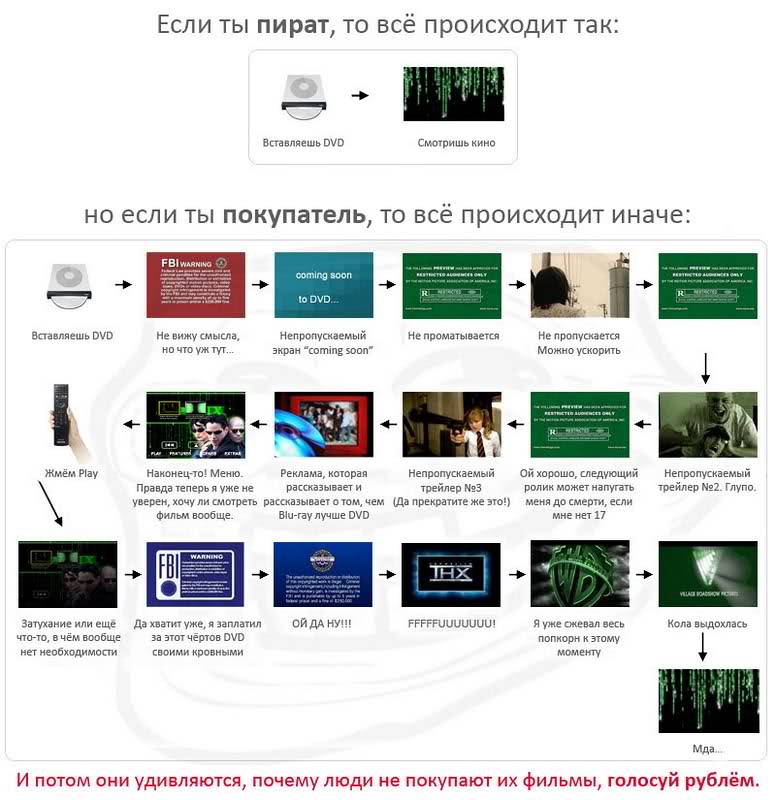When licensed content is not needed
Yesterday there appeared a blog entry of a respected forgotten about how interesting the system of unlimited access to licensed content would be for a fixed monthly fee paid monthly.
Unfortunately, almost no one was affected by the topic of higher quality unlicensed content compared to the licensed one. Only TheShock remembered and provided an excellent picture that right-handed people love to “load” and impenetrable warnings about the inadmissibility of copying a disc, and advertisements of other films, so that all this incredibly “gets” the viewer even before he starts watching. desired movie:

Good but not enough. I propose to immerse myself in this problem a little deeper and watch those cases where not only the accompanying crap, but even licensed video itself can be so unnecessary for the viewer that he is fully prepared to resort to the services of so-called “pirates” with great gratitude and even consider them to be benefactors of humanity.
')
Hundreds and thousands of TV series fans visit the TV Underground site, where they get hyperlinks to TV series allowing them to be obtained via file sharing (using the ed2k network, or Kad, or torrents). Every month, the entire world collects half a kilopack for maintaining the performance of this site and the accompanying searched2k server.
Hundreds and thousands of video and movie lovers visit the ShareTheFiles site (where it is not difficult to get ed2k hyperlinks of the desired films) or torrent trackers, where they achieve the desired content.
Hundreds and thousands of anime lovers visit the AnimeTake website, which this morning lay down for an unknown reason, but before that allowed to get videotapes of the anime either using torrents or from file hosting sites, also called “file sharing” (Megaupload, Hotfile, FileServe, and the like). Their services also include the AniDB server, which stores the masses of animeed2k hashes (generally, they are suitable for file identification and integrity monitoring, but also for file sharing across ed2k and Kad networks).
What are all these people looking for there? What do the “pirates” give them, but the traffickers cannot give them?
 First, the availability of cultural product. The series, film, anime, released abroad, it is often simply impossible to buy in Russia legally. Hate from the Soviet times, "not delivered", which is overcome by the file sharing of the XXI century.
First, the availability of cultural product. The series, film, anime, released abroad, it is often simply impossible to buy in Russia legally. Hate from the Soviet times, "not delivered", which is overcome by the file sharing of the XXI century.
Secondly, the speed of distribution of the cultural product. A series, film, anime, released abroad, often appear in Russia in legal form only after six months, or a year, or even a few years, and then first on the screens of cinemas, then on the screens of zomboyaschikas, and only after that - for home view. By the time they are no longer relevant. “Pirate” file sharing makes them available on the day of release in the country of origin - or the next day.
Thirdly, access to a genuine audio track. The actor plays not only mimicry, gestures, posture, but also voice, breathing, timbre, speech intonations. No matter how talented the voice-over is, she’s not Monica Bellucci and Rie Cagimia (in the photo on the right), so any voice translation is a crime against the original source’s cultural value, and the voice-over is often more or less mutilated. background noise, off-screen music, special effects sounds, and so on. In the "pirate" file sharing video is available with untouched sound, and the translation is provided with subtitles, which are either included in finished form in a video container (like most of the "locked up" anime), or procured by interested people from alternative sources (say, from the Subscene site). In the licensed videos sold in Russia, the original sound is found less and less.
 Fourth, the ability to refuse poor-quality translation.
Fourth, the ability to refuse poor-quality translation. The LJ community sadtranslations provides several thousand examples of wild bloopers in translations of films and television series. (The most egregious ones are animated in the illustration on the right.) However, in the “pirate” version, the viewer, as a rule, gets a choice from several translation options - from several different “pirated” groups or individual translators-illegals. And if the viewer also knows English - even if not enough to catch up with the voice, but sufficiently for reading - then the viewer also has the opportunity to watch an English-language film with English-language subtitles (flaws in which he can assess on his own), the ability to watch Anime with English subtitles (the quality of translation in which is usually better than that of Russian translators). In the licensed videos sold in Russia, there is only one translation, and if it is not of high quality, it means no luck. Making your own translation without the consent of the legal merchant is illegal, but it will not give consent.
| > 600 comments | Many of you have left comments there devoted to a number of burning questions, |

Good but not enough. I propose to immerse myself in this problem a little deeper and watch those cases where not only the accompanying crap, but even licensed video itself can be so unnecessary for the viewer that he is fully prepared to resort to the services of so-called “pirates” with great gratitude and even consider them to be benefactors of humanity.
')
Hundreds and thousands of TV series fans visit the TV Underground site, where they get hyperlinks to TV series allowing them to be obtained via file sharing (using the ed2k network, or Kad, or torrents). Every month, the entire world collects half a kilopack for maintaining the performance of this site and the accompanying search
Hundreds and thousands of video and movie lovers visit the ShareTheFiles site (where it is not difficult to get ed2k hyperlinks of the desired films) or torrent trackers, where they achieve the desired content.
Hundreds and thousands of anime lovers visit the AnimeTake website, which this morning lay down for an unknown reason, but before that allowed to get videotapes of the anime either using torrents or from file hosting sites, also called “file sharing” (Megaupload, Hotfile, FileServe, and the like). Their services also include the AniDB server, which stores the masses of anime
What are all these people looking for there? What do the “pirates” give them, but the traffickers cannot give them?
 First, the availability of cultural product. The series, film, anime, released abroad, it is often simply impossible to buy in Russia legally. Hate from the Soviet times, "not delivered", which is overcome by the file sharing of the XXI century.
First, the availability of cultural product. The series, film, anime, released abroad, it is often simply impossible to buy in Russia legally. Hate from the Soviet times, "not delivered", which is overcome by the file sharing of the XXI century.Secondly, the speed of distribution of the cultural product. A series, film, anime, released abroad, often appear in Russia in legal form only after six months, or a year, or even a few years, and then first on the screens of cinemas, then on the screens of zomboyaschikas, and only after that - for home view. By the time they are no longer relevant. “Pirate” file sharing makes them available on the day of release in the country of origin - or the next day.
Thirdly, access to a genuine audio track. The actor plays not only mimicry, gestures, posture, but also voice, breathing, timbre, speech intonations. No matter how talented the voice-over is, she’s not Monica Bellucci and Rie Cagimia (in the photo on the right), so any voice translation is a crime against the original source’s cultural value, and the voice-over is often more or less mutilated. background noise, off-screen music, special effects sounds, and so on. In the "pirate" file sharing video is available with untouched sound, and the translation is provided with subtitles, which are either included in finished form in a video container (like most of the "locked up" anime), or procured by interested people from alternative sources (say, from the Subscene site). In the licensed videos sold in Russia, the original sound is found less and less.
 Fourth, the ability to refuse poor-quality translation.
Fourth, the ability to refuse poor-quality translation. Source: https://habr.com/ru/post/119210/
All Articles